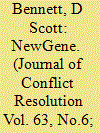| Srl | Item |
| 1 |
ID:
065774


|
|
|
| 2 |
ID:
167375


|
|
|
|
|
| Summary/Abstract |
This article introduces NewGene, a complete redesign of the popular EUGene software. Like its predecessor, NewGene is designed to eliminate many of the difficulties commonly involved in constructing large international relations data sets. NewGene is a stand-alone Microsoft Windows and OSx-based program for the construction of annual, monthly, and daily data sets for a variety of decision-making units (e.g., countries, leaders, organizations) used in quantitative studies of international relations. It also provides users the ability to construct units of analysis ranging from monads (e.g., country-year), to dyads (e.g., country1-country2-year), to extra-dyadic observations called k-ads (e.g., country1-country2-year,…, -countryk-year). NewGene’s purpose is to provide a highly flexible platform on which users can construct data sets for international relations research using preloaded data or by incorporating their own data. The software is freely available at http://www.newgenesoftware.org/.
|
|
|
|
|
|
|
|
|
|
|
|
|
|
|
|
| 3 |
ID:
069111


|
|
|
| 4 |
ID:
074825


|
|
|
|
|
| Publication |
2006.
|
| Summary/Abstract |
It has recently been argued that apparent peace between democracies may be the result of political similarity rather than joint democracy, and that there may exist an "autocratic peace" which is similar to the democratic peace. If political similarity generally is the cause of peace rather than joint democracy specifically, then the democratic peace is merely a statistical artifact that follows from separating out a selected subset of data. In addition, we do not know whether the autocratic peace or democratic peace is stronger, if they both exist. Existing empirical specifications of the connection between joint regime type and international conflict have not been adequate to assess these arguments. I develop a specification of joint regime-type variables that uses continuous measures without arbitrary cutoffs and allows us to assess a larger set of hypothesized regime-type effects. I find that jointly democratic and jointly autocratic pairs of states are both less conflict prone than other pairings, but that political similarity apart from these extremes has a much smaller effect on the risk of conflict. The results suggest that political similarity between coherent regimes (those at extremes of the institutionalized democracy-autocracy scale) encourages dyadic peace. But although there is a lower risk of conflict in both jointly democratic and jointly autocratic dyads, I find that the democratic peace is clearly stronger than the autocratic peace.
|
|
|
|
|
|
|
|
|
|
|
|
|
|
|
|